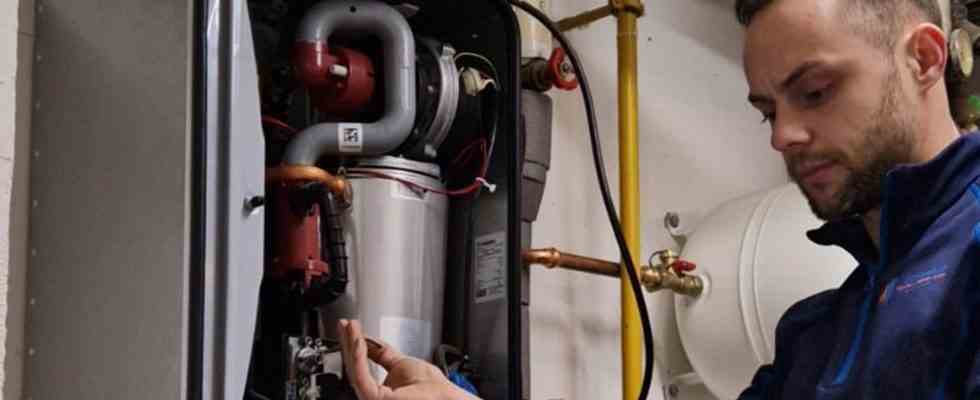Status: 03/18/2023 03:55 a.m
The heating industry relies primarily on the heat pump in the course of conversions. However, industry experts are skeptical that six million heat pumps can be installed in Germany by 2030.
Mario Schunk is in a hurry. He is on his way to a customer early in the morning. Schunk runs a heating and air conditioning company in Neuwied, Rhineland-Palatinate. “The debate about the future of oil and gas heating has fueled business again. People are completely unsettled,” says the 46-year-old master heating engineer as he makes his way to the village of Nauroth.
“Individual solutions on site”
“It’s about an apartment building that will probably be heated by air conditioning in the future. Neither gas heating nor a heat pump are really suitable for this property. You need individual solutions on site. Every building and every customer is different,” says Schunk, while he is in his car rises. Incidentally, his car runs on electricity because it makes financial sense for him and his company.
“Last time we installed about 150 gas heaters per year. This year it will probably be well over 400, maybe even 500,” says Schunk while driving on the country roads in the north of Rhineland-Palatinate. “Many now want to install gas heating quickly, before it might be banned next year.”
Order doubling for heat pumps
The installation of heat pumps will probably double at his company – to around 80 – although there is some skepticism about heat pumps: “Some customers are wondering how expensive electricity will be in the future and what the security of supply is like,” says the heating master from his Everyday. More and more owners are also discovering air conditioning as a heat source. There was little demand from him for new oil heaters.
The decisive factor is the individual situation of the client – how many parties live in the house? What kind of building is it? What is the financial budget? “If you buy a new car, it has to be tailored to your individual needs,” says Schunk.
Fast 70,000 euros costs for renovation
For the craftsman, the age of the customer also plays a role: “From the age of 50, I recommend a particularly accurate calculation. Is there an alternative to the heat pump that costs at least 20,000 euros more?” says Schunk. A combination of gas and air conditioning is often the solution.
“On the other hand, I often advise younger people to get a heat pump. But the building also has to be suitable for this.” Because: If there is poor insulation and an older pipe system, 70,000 euros would quickly come together for the renovation. “A lot of people can’t afford it. You shouldn’t overwhelm people. In the end, everything depends on the building physics of a house.”
Jakob Köllisch has been out and about in Frankfurt am Main in the past few days. The foreman of the German Wine Route heating guild took a look around the exhibition halls at the world’s leading trade fair ISH. “There is a lot of uncertainty and even more questions about the previous draft bill in the Federal Ministry of Economics. You could have asked for advice beforehand,” says Köllisch, summing up the mood.
Skepticism at the heating fair
Trade representatives became even clearer. The general manager of the Central Association for Sanitary, Heating and Air Conditioning, Helmut Bramann, warned that politics must be based on the realities of the market and start with the end customer. He also criticized Habeck very directly: “A climate change is unlikely to succeed with a snap of the fingers at the cabinet table.”
Köllisch also sees many difficulties: heat pumps cannot always be installed in old buildings. Many houses are also not adequately insulated. Small radiators would be unsuitable. Overall, renovations would be far too expensive for many owners and tenants. “What does the electricity mix of the future actually look like? If it comes largely from coal, the heat pumps won’t help the climate,” Köllisch points out.
And what does the heating engineer suggest? “The technology is currently being further developed and refined under high pressure. In a few years we will be much further. Then we can gradually change over. That is also really good for the environment.”
A lack of skilled workers also stands in the way of the goal
However, it also became clear at the trade fair: Despite the still unclear specifications, the industry relies on the heat pump. For example, the heating technology company Viessmann is building a new plant in Legnica, Poland. The group intends to invest a total of one billion euros in new production facilities for the heat transition.
Industry experts are nevertheless skeptical that six million heat pumps can be installed in Germany by 2030, as the federal government is planning. In addition to the high costs for the owners, the shortage of skilled workers is also a major problem.
Act quickly before it’s too late
Schunk, the heating engineer, has meanwhile arrived in Kettig near Koblenz. Olaf Hensen and his wife decided on a gas boiler. They have just completely renovated their house. “Actually, we wanted to do a few other things in the building first. But we prefer the heating now and will have a new, energy-efficient gas boiler installed this year,” says the 43-year-old homeowner. “Who knows what else is coming from Berlin? That way we’re on the safe side.”
After the conversion costs for the house, he cannot currently afford an additional 25,000 euros for a heat pump. In addition, there are still too many unanswered questions for Hensen: “Is this new system technically mature? It’s all too hasty for me. A modern gas boiler works very efficiently and also protects the environment. At least I know what I’m getting.”

